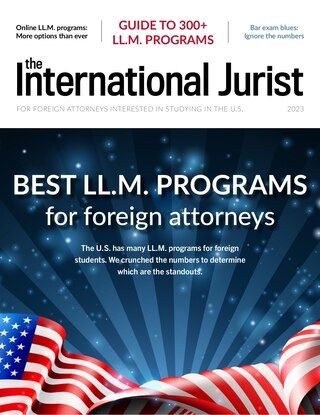On July 6, U.S. Immigration and Customs Enforcement (ICE) issued a broadcast message that sent shockwaves through the international student community. This article will share background information, summarize the broadcast message, and discuss the implications it will have for international law students seeking to study in the U.S.
Background
In “normal” times, without a virus upsetting the entire globe, international students with an F-1 visa may not enroll in more than the equivalent of one class or three credits in classes taken through distance education. 8 CFR 214.2(f)(6)(i)(G).
This past spring semester, the coronavirus forced many U.S. states to enforce a lockdown. University and college campuses closed, and teaching moved online. In response, ICE issued an exception from the in-person requirement, and international students were able to stay in the U.S. while studying online.
Everyone was eagerly awaiting guidance regarding the fall, which came last Monday in the form of the latest ICE broadcast message.
ICE Broadcast Message
The broadcast message issued by ICE on July 6 abruptly stated that international students would not be allowed to stay in the country if they were taking only online classes. ICE would allow F-1 students to remain in the country, however, if they attend a school using a “hybrid” model in which some courses are online and some are in-person, as long as visa holders took some in-person classes.
Lawsuits
Harvard University and the Massachusetts Institute of Technology (MIT) sued in federal court to block the new policy, claiming Administrative Procedure Act violations. More specifically, it alleges that universities and students relied on ICE’s previous statement that the waiver of online learning restrictions would remain “in effect for the duration of the emergency,” which is unquestionably ongoing. A decision is expected on Wednesday, July 15. Another lawsuit was filed last week in California, and attorneys general in 17 states and the District of Columbia have filed a lawsuit this Monday.
Now what?
Many are waiting with anticipation for court decisions. In the meantime, law schools across the country are trying to find a hybrid solution for their international law students. A temporary restraining order and preliminary injunction, if granted, would halt enforcement of the guidelines, and would give us some room to breathe. However, uncertainty will remain about when and how the litigation will end. Law schools will do everything in their power to save their students from having to self-deport. Educational institutions have been nimble and more creative than ever to ensure a valuable learning environment while keeping their communities safe.
* * *
ICE has put us all in an uncomfortable situation in which we may have to decide between putting the health of our students at risk or having them forced to leave the country. All international students should know that law schools and universities around the nation stand with you and are working day and night to come up with creative solutions to this conundrum.
Updated July 15, 2020, 9:00 A.M. EST
In a swift reversal, the Trump administration has agreed to rescind the July 6 directive. ICE and DHS have reached an agreement with Harvard and MIT. Federal Judge Allison D. Burroughs announced the resolution less than five minutes into the hearing on Tuesday.
ICE will reinstate the guidelines it applied to the Spring 2020 semester, which allowed international students with F-1 visas to take fully online course loads while retaining their visa status.
Desiree Jaeger-Fine is director of Global Engagement and International Programs at Brooklyn Law School and author of “A Short & Happy Guide to Networking” (West Academic Publishing) and “A Short & Happy Guide to Being Hired” (West Academic Publishing).






